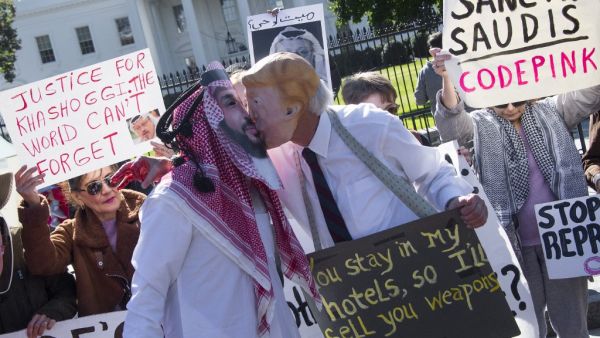A newly declassified US intelligence has said that Saudi Arabia's crown prince had approved the operation to kill or capture a US-based journalist inside the Saudi consulate in Istanbul.
The release of the report on Friday is likely going to escalate pressure on Saudi Arabia as President Joe Biden's administration shifts its longtime and transactional relationship with the kingdom.
The central conclusion of the report was widely expected given that intelligence officials were said to have reached it soon after the brutal October 2, 2018 murder of Jamal Khashoggi, a critic of Crown Prince Mohammed bin Salman.
Still, since the finding had not been officially released until now, the public assignment of responsibility amounted to an extraordinary rebuke of the ambitious 35-year-old crown prince and was likely to set the tone for the new administration's relationship with a country Biden has criticised but which the White House also regards in some contexts as a strategic partner.
US Treasury Department said it would block assets and criminalise transactions with the Rapid Intervention Force, which a declassified intelligence report said was answerable to Crown Prince bin Salman, as well as former intelligence official Ahmed al Assiri.
Biden's actions in the first weeks of his administration appear aimed at fulfilling campaign promises to realign Saudi ties after critics accused his predecessor, Donald Trump, of giving the Arab ally and major oil producer a pass on gross human rights violations.
Kingdom 'completely rejects' US assessment
Saudi Arabia on Friday said it "completely rejects" the US intelligence report.
"The government of the kingdom of Saudi Arabia completely rejects the negative, false and unacceptable assessment in the report pertaining to the kingdom's leadership, and notes that the report contained inaccurate information and conclusions," the Saudi foreign ministry said in a statement.
I just finished reading the declassified memo on killing of #Khashoggi. I’ve read thousands of intel reports in my career in national security, but this one stands out. Here’s why we need to take this seriously and why we need to do more to hold Crown Prince accountable. THREAD pic.twitter.com/EFQqEuGYKQ
— Andy Kim (@AndyKimNJ) February 27, 2021
Activists react
Activists and rights groups, however, clamored for justice and sanctions against Saudi Arabia and MbS on social media.
“Thank you, Joe Biden for transparency about Jamal Khashoggi’s murder. Now we need sanctions on the Saudi prince responsible,” Democracy for the Arab World Now (DAWN), a US-based human rights group founded by Khashoggi, said in a statement.
An “MbS-Khashoggi-killer” hashtag started trending after the release of the report.
Speaking after the report’s release, Yahya Assiri, a prominent Saudi dissident in exile who serves as the secretary general of a recently formed opposition group, the National Assembly Party, added his party’s support for the report’s findings but called for more stringent measures against MbS and those responsible.
“We renew our demands that those responsible must appear before an honest and fair international tribunal,” he said.
Hatice Cengiz, Khashoggi’s fiancee, tweeted: “#justiceforjamal”.
US slaps sanctions
"Those involved in the abhorrent killing of Jamal Khashoggi must be held accountable," Treasury Secretary Janet Yellen said in a statement on Friday.
"The United States stands united with journalists and political dissidents in opposing threats of violence and intimidation."
It came after President Biden declassified an intelligence report that found that Crown Prince Mohammed bin Salman approved an operation in 2018 that led killing of Khashoggi in the Saudi consulate in Istanbul.
The report said that seven of the 15 members of the hit squad belonged to the Rapid Intelligence Force.
Assiri, part of the crown prince's inner circle, was exonerated in a closed-door trial in Saudi Arabia that was sharply criticised by rights groups.
Khashoggi: statement clarifying US stance on Saudi Arabia due on Monday https://t.co/IzCiGYFReE
— The Guardian (@guardian) February 27, 2021
US rewriting ties with Saudi
Biden's administration is considering the cancellation of arms deals with Saudi Arabia that pose human rights concerns while limiting future military sales to "defensive" weapons, as it reassesses it relationship with the kingdom.
Four sources familiar with the administration's thinking said that after pausing half a billion dollars in arms deals with Saudi Arabia out of concern over casualties in Yemen earlier this year, officials are assessing the equipment and training included in recent sales to determine what can be considered defensive.
A State Department spokesperson said, "Our focus is on ending the conflict in Yemen even as we ensure Saudi Arabia has everything it needs to defend its territory and its people," adding Biden has pledged to end US military support for the military campaign against the Houthis.
The Biden administration is recalibrating its relationship with Saudi Arabia, a country which is also one of Washington's closest US allies in countering the threat posed by Iran.
"They're trying to figure out where do you draw the lines between offensive weapons and defensive stuff," said one congressional aide familiar with the issue, describing the process.
Defensive vs offensive weapons
Sales of products deemed defensive – like Terminal High Altitude Area Defense (THAAD) anti-ballistic missile defence systems made by Lockheed Martin or Patriot missile defence systems made by Lockheed and Raytheon – would still be allowed under such the new policy.
But it would end big-ticket deals – for products such as precision-guided munitions (PGM) and small-diameter bombs – like those brokered under Trump in the face of strong objections from members of Congress.
After he lost the November 3 presidential election, Trump's State Department kept approving weapons sales that could be considered offensive.
It cleared the sale of Boeing Co GBU-39 small diameter bombs worth some $290 million to Saudi Arabia. The Trump administration also gave its blessing to the sale to Riyadh of 7500 Raytheon PGMs for nearly $480 million.
The weapons review also affects $23 billion of deals with the United Arab Emirates, another country that has been an important US partner.
This article has been adapted from its original source.








